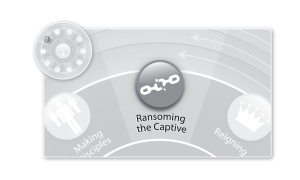Post by Pastor Tim – Ransoming the captive is not something that you can just roll out of bed and do. It requires faithfulness in all the other works of mercy and a willingness to go where many are not willing to go. That is precisely why I’ve been praying in regards to this work of mercy. I knew I couldn’t manufacture a ransoming opportunity on my own . . . I would need the Lord’s direction.
God didn’t bring anyone new into my life, but he did open my eyes to an old friend who needs help. Ransoming is a spirit-soul-body activity, and my friend certainly needs ransoming in all three areas.
A number of years ago he was convicted of a crime and since that point in time his life has gone in a downward spiral. He has financially mismanaged his own money (and other peoples’ money as well), he has not been able to keep a job and now his health is deteriorating. Not all of these problems are entirely his fault, but a good bit of them are his own doing so that now there is almost no one willing to help him.
My personality is to give “pats on the back” followed up with endless kindness and encouragement. But that’s not the entire picture of ransoming that we get from God. Pastor Foley said,
God is portrayed in Scripture not only as the one who ransoms his people from captivity . . . but also as the one who sends his people into captivity in the first place!
Leviticus 26 is a great example of how God does both. In verse 13 God reminded his people how He originally freed them by saying,
I am the LORD your God, who brought you out of the land of Egypt, that you should not be their slaves. And I have broken the bars of your yoke and made you walk erect.
But God went on to say,
But if you will not listen to me . . . I will set my face against you, and you shall be struck down before your enemies . . . and those of you who are left shall rot away in your enemies’ lands(Lev. 26:14, 17, 39)
“Wow . . . not the kind of God I want to ransom me,” you might say, but listen to the following verses,
Yet for all that, when they are in the land of their enemies, I will not spurn them, neither will I abhor them so as to destroy them utterly and break my covenant with them, for I am the LORD their God. But I will for their sake remember the covenant with their forefathers, whom I brought out of the land of Egypt in the sight of the nations, that I might be their God: I am the LORD.” (Lev. 26:44-45)
The moral of the story for me and my friend? I know that to mirror God’s heart for ransoming, I need to go beyond “pats on the back.” It’s good to be kind and encouraging, but sometimes the ransoming process needs to come full circle by first allowing the Lord to bring someone through difficult situations. Part of this “full circle” is a recognition of our sin and a willingness to respond in humility to the correction that’s needed (Lev. 26:40-41). In other words, ransoming is never complete if we see ourselves as simply a victim of circumstances and bad luck.
I think this is the case with my friend. He is presently in a difficult situation, (in part) due to his own making, and rescuing him from a situation that the Lord is using to form and shape him would be circumventing the Lord’s process of pruning and growing.
That’s not an “easy way out” for me, but rather an opportunity for both my friend and I that the Lord is accomplishing His work.












Reblogged this on Missio Links and commented:
“Ransoming the Captives” is one of the 10 “Works of Mercy” that form the broad outline of Rev. Eric Foley’s “The Whole Life Offering”. Rev. Foley’s suggestion is that February through November, churches spend one month on each “Work of Mercy”. January is for preparation and December is for review essentially. Here’s a post on the work of mercy “Ransoming the Captive”.